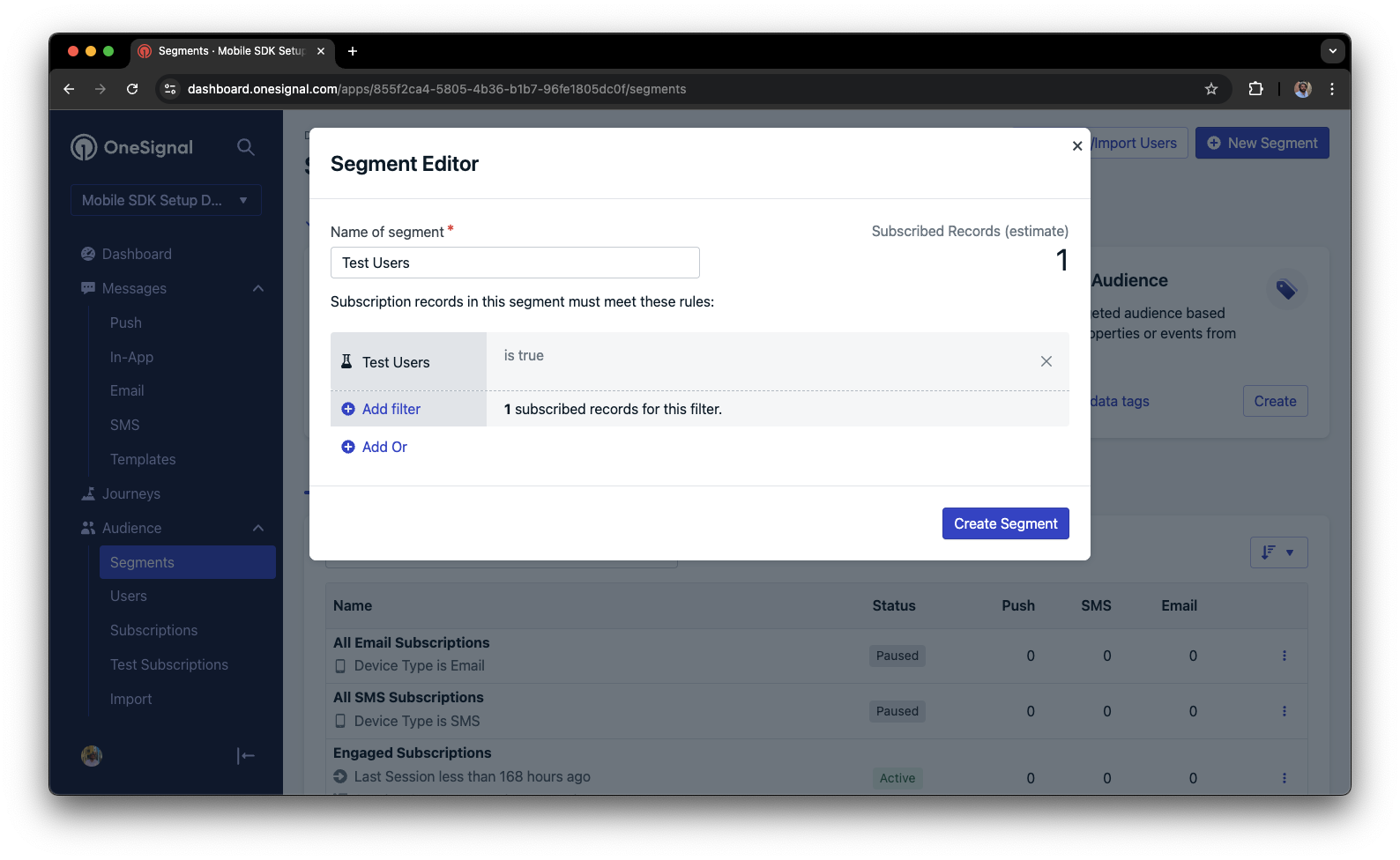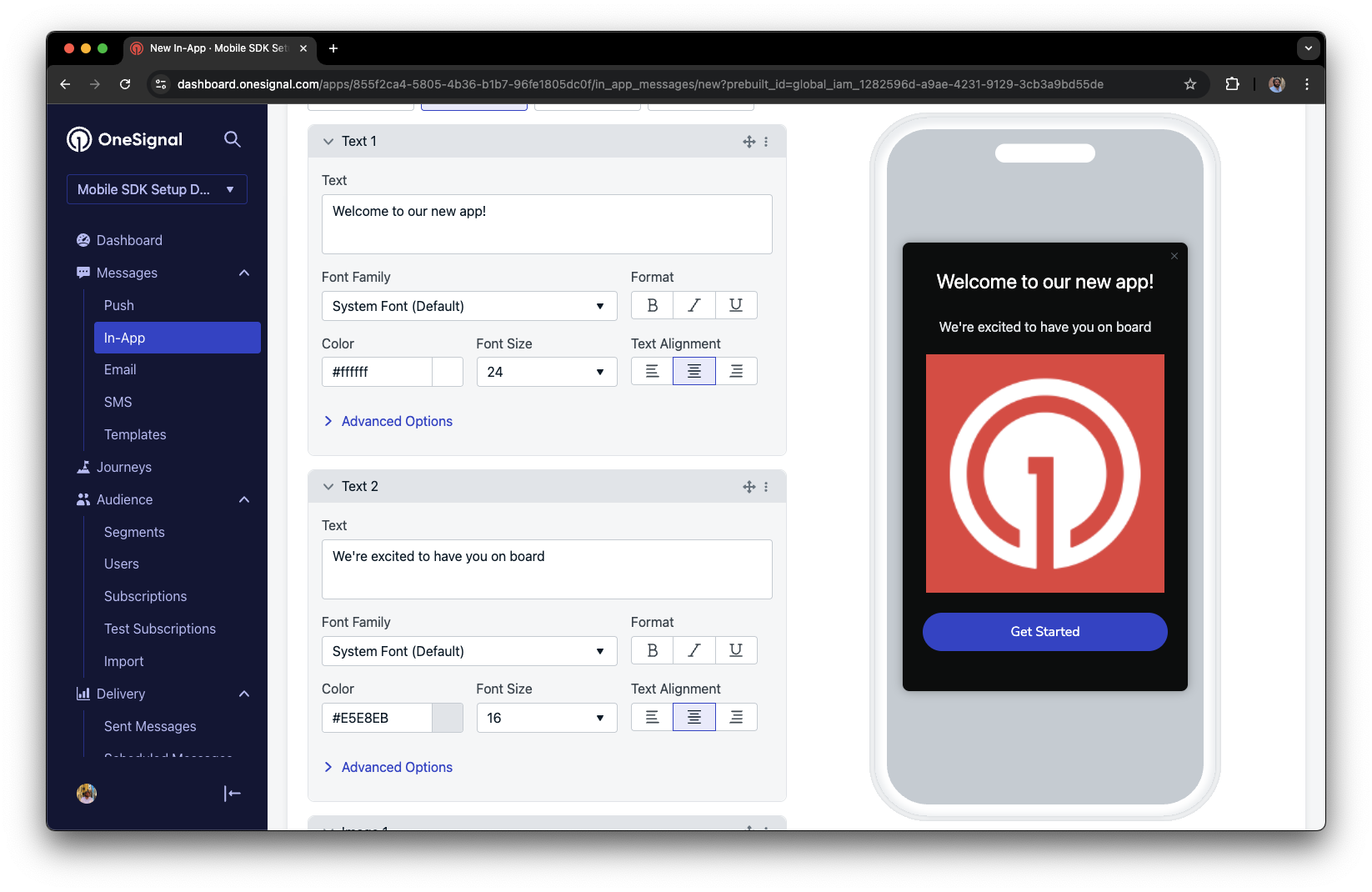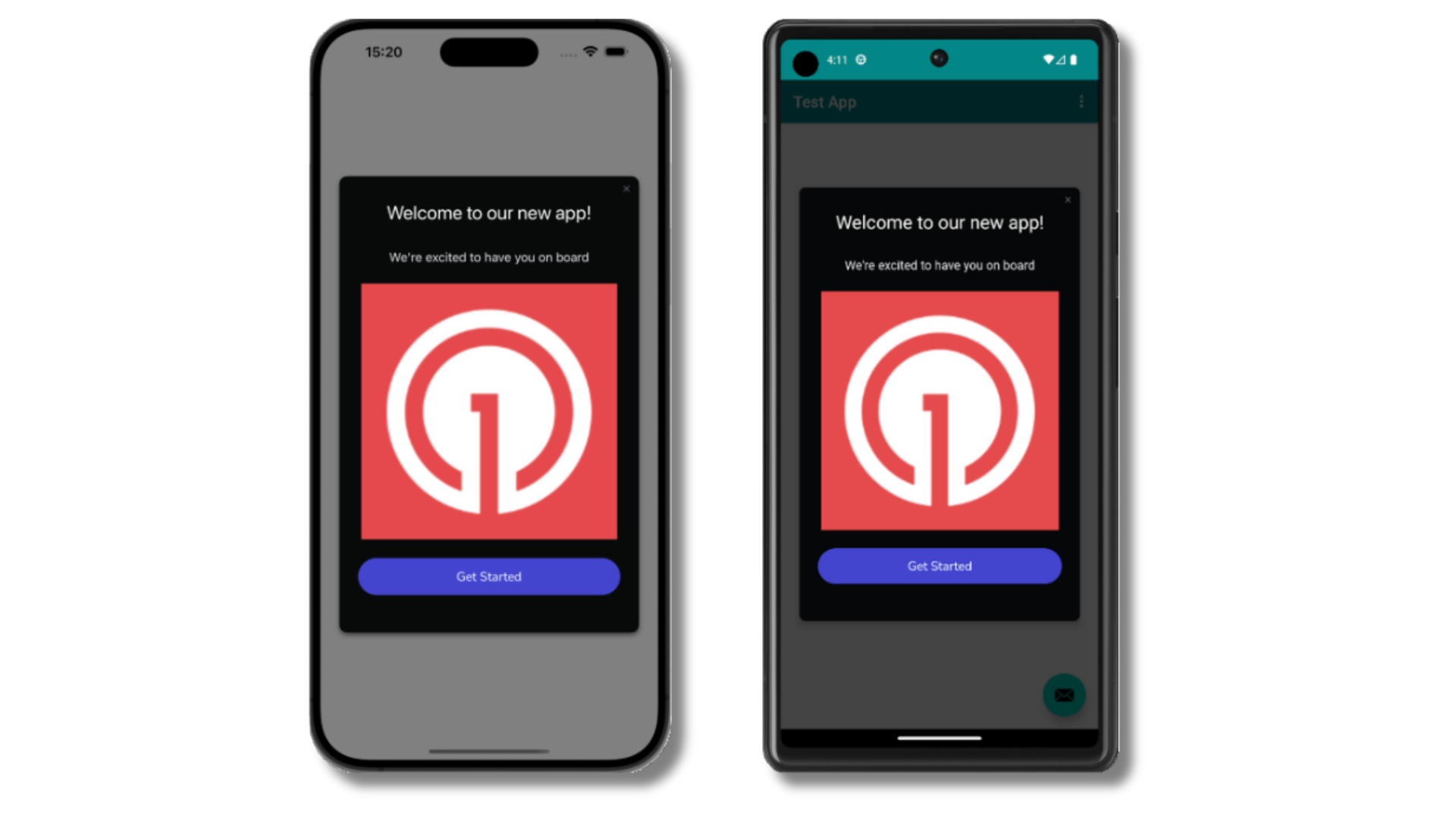Overview
This guide explains how to integrate OneSignal push notifications into a Flutter application distributed on the Huawei AppGallery. Only follow these instructions if your app is distributed on the Huawei AppGallery.Requirements
- Android Studio
- A Huawei device with “Huawei App Gallery” installed
- Configured OneSignal App and Platform
Configure your OneSignal app and platform
Required setup for push notifications To start sending push notifications with OneSignal, you must first configure your OneSignal app with all the platforms your support—Apple (APNs), Google (FCM), Huawei (HMS), and/or Amazon (ADM).If your organization already has a OneSignal account, ask to be invited as an admin role to configure the app. Otherwise, sign up for a free account to get started.
Step-by-step instructions for configuring your OneSignal app.
Step-by-step instructions for configuring your OneSignal app.
You can manage multiple platforms (iOS, Android, Huawei, Amazon, Web) under a single OneSignal app.
Create or select your app
- To add platforms to an existing app, go to Settings > Push & In-App in the OneSignal dashboard.
- To start fresh, click New App/Website and follow the prompts.
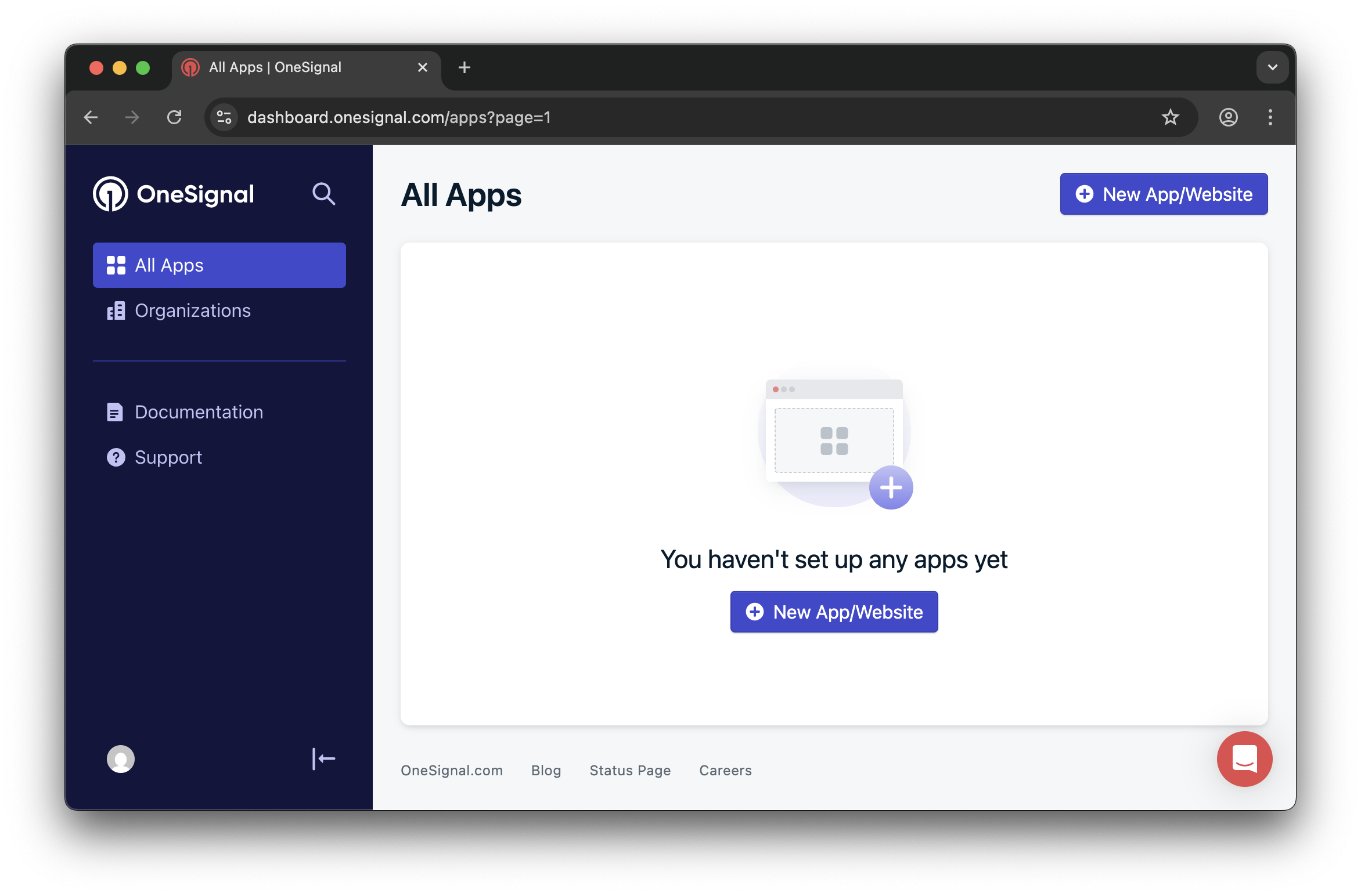
Set up and activate a platform
- Choose a clear and recognizable name for your app and organization.
- Select the platform(s) you want to configure (iOS, Android, etc.).
- Click Next: Configure Your Platform.
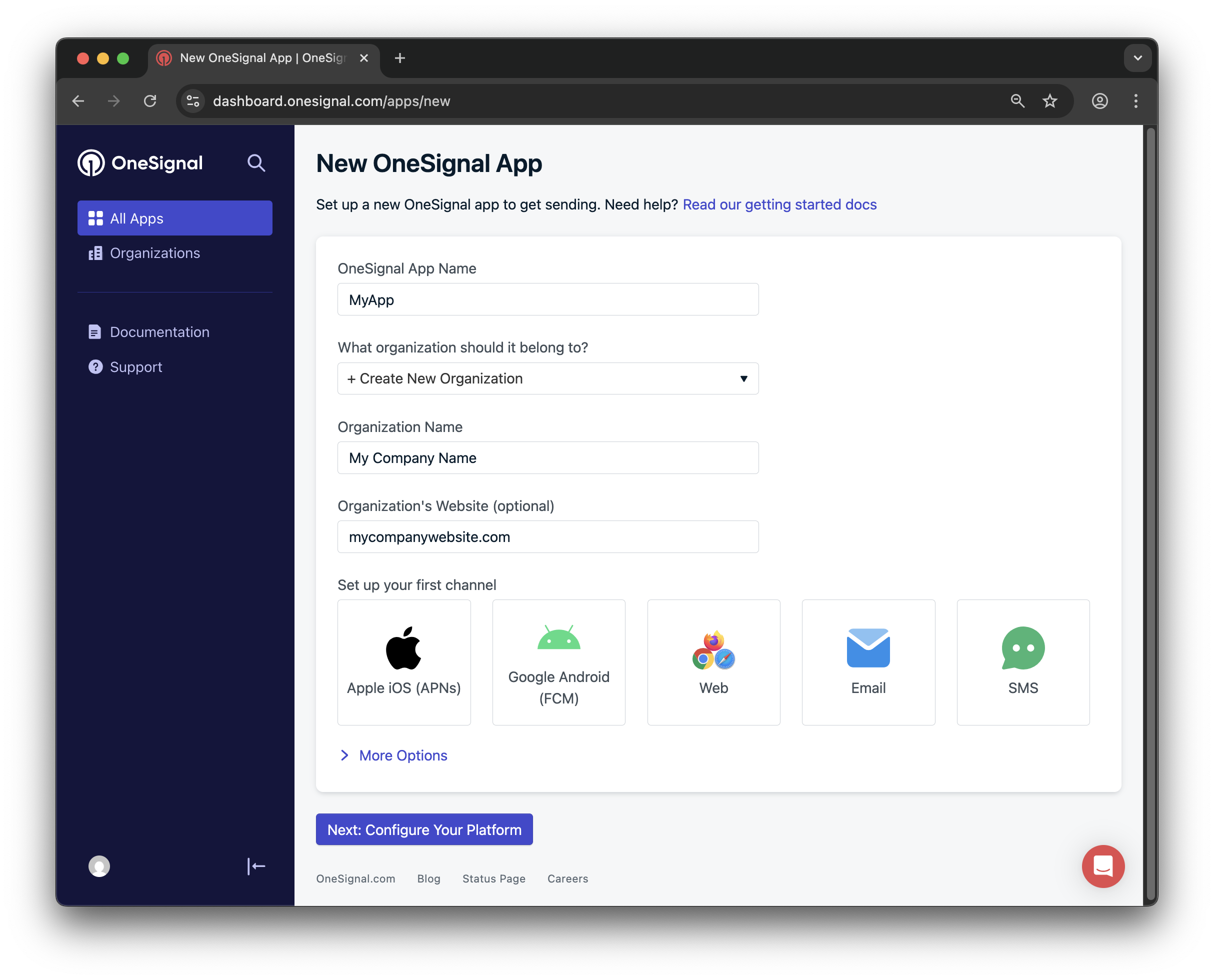
Configure platform credentials
Follow the prompts based on your platforms:
- Android: Set up Firebase Credentials
- iOS: p8 Token (Recommended) or p12 Certificate
- Amazon: Generate API Key
- Huawei: Authorize OneSignal
Choose target SDK
Select the SDK that matches your development platform (e.g., iOS, Android, React Native, Unity), then click Save & Continue.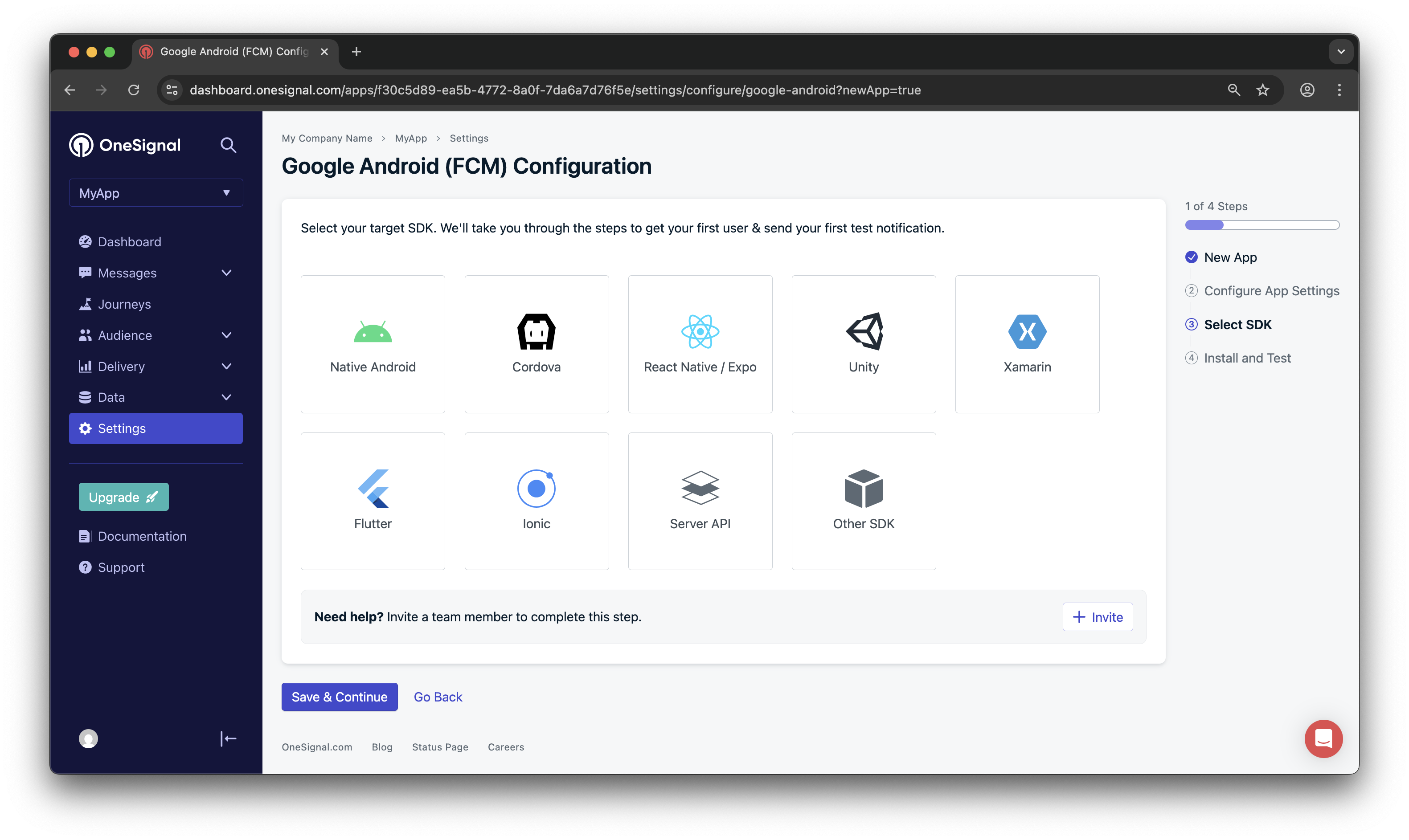

Install SDK and save your App ID
Once your platform is configured, your OneSignal App ID will be displayed. Copy and save this ID—you’ll need it when installing and initializing the SDK.If collaborating with others, use the Invite button to add developers or teammates, then click Done to complete setup.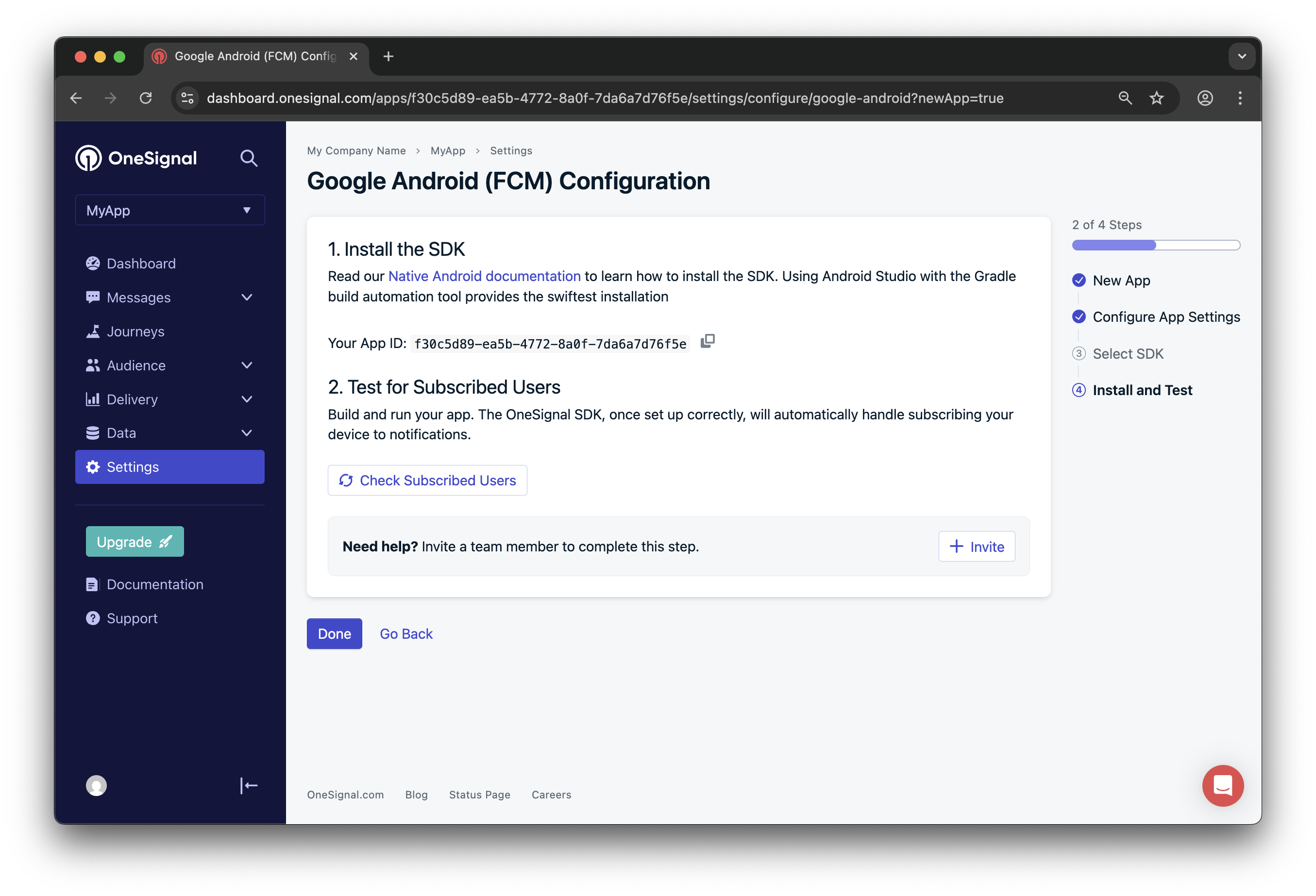

Setup
1. Setup the OneSignal SDK
OneSignal Flutter SDK setup
Follow the OneSignal Flutter SDK setup guide to implement our SDK into your app.
Note that Firebase/Google setup is not required for app builds released to the Huawei AppGallery.
2. Huawei configuration
Configure App Information in AppGallery Connect See Huawei’s Configure App Information in AppGallery Connect Add dependencies to Flutter android project Under project build.gradle add the followingAdditional configuration steps
Flutter Huawei plugin setup (optional)
OneSignal does not require the Flutter Huawei plugin and in most cases you can omit this. However, if you need specific Huawei features in Flutter see Integrating Flutter HMS Push Kit Module When following the plugin setup, after downloading the plugin remove the FlutterHMSMessageService from the downloaded plugin’sAndroidManifest.xml file under the android package.

Huawei location service (optional)
Addimplementation 'com.huawei.hms:location:<HUAWEI HMS VERSION #> to your app build.gradle’s dependencies section.
Make sure to also add the location permission to your AndroidManifest.xml if you don’t have this already
Huawei troubleshooting
While testing, make sure to keep the OneSignal setLogLevel method set to VERBOSE. Check the logs to see any errors being thrown and Huawei Common Error Codes.6003 error
6003 error
You may need to create a debug or release keystore signature (choose the correct app build path,
debug or release) so that a 6003 error is avoided when registering for Huawei pushToken with the OneSignal SDK. See “Configure a Signature” sectionnotification_types: -28
notification_types: -28
This means there is a class HMS is missing from the app that is needed for push. Just having
com.huawei.hms:push in the build.gradle will cause this specific error not to happen any more. However, if you have some aggressive Proguard or R8 settings, this might cause issues. We recommend turn off minifyEnabled temporary if you have it to see if that is the root of the issue.Also, you shouldn’t mix and match major release versions of other HMS libraries. Start with either 4 or 5. Make sure not to have a mixture from 3 to 5 which is going to create other errorsError getting Huawei push token
Error getting Huawei push token
Testing the OneSignal SDK integration
This guide helps you verify that your OneSignal SDK integration is working correctly by testing push notifications, subscription registration, and in-app messaging.Check mobile subscriptions
Launch your app on a test device.
The native push permission prompt should appear automatically if you added the 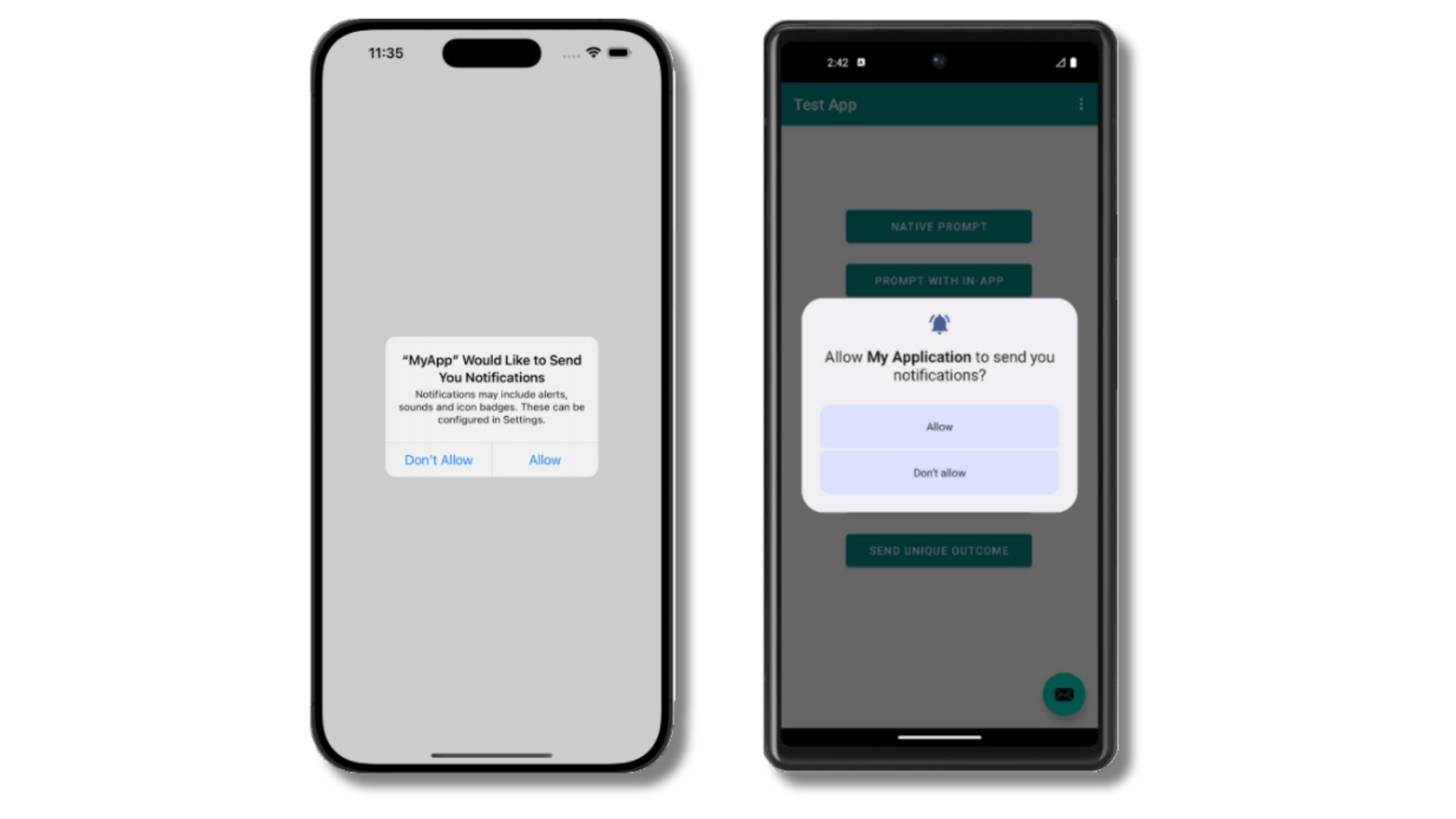
requestPermission method during initialization.
Check your OneSignal dashboard
Before accepting the prompt, check the OneSignal dashboard: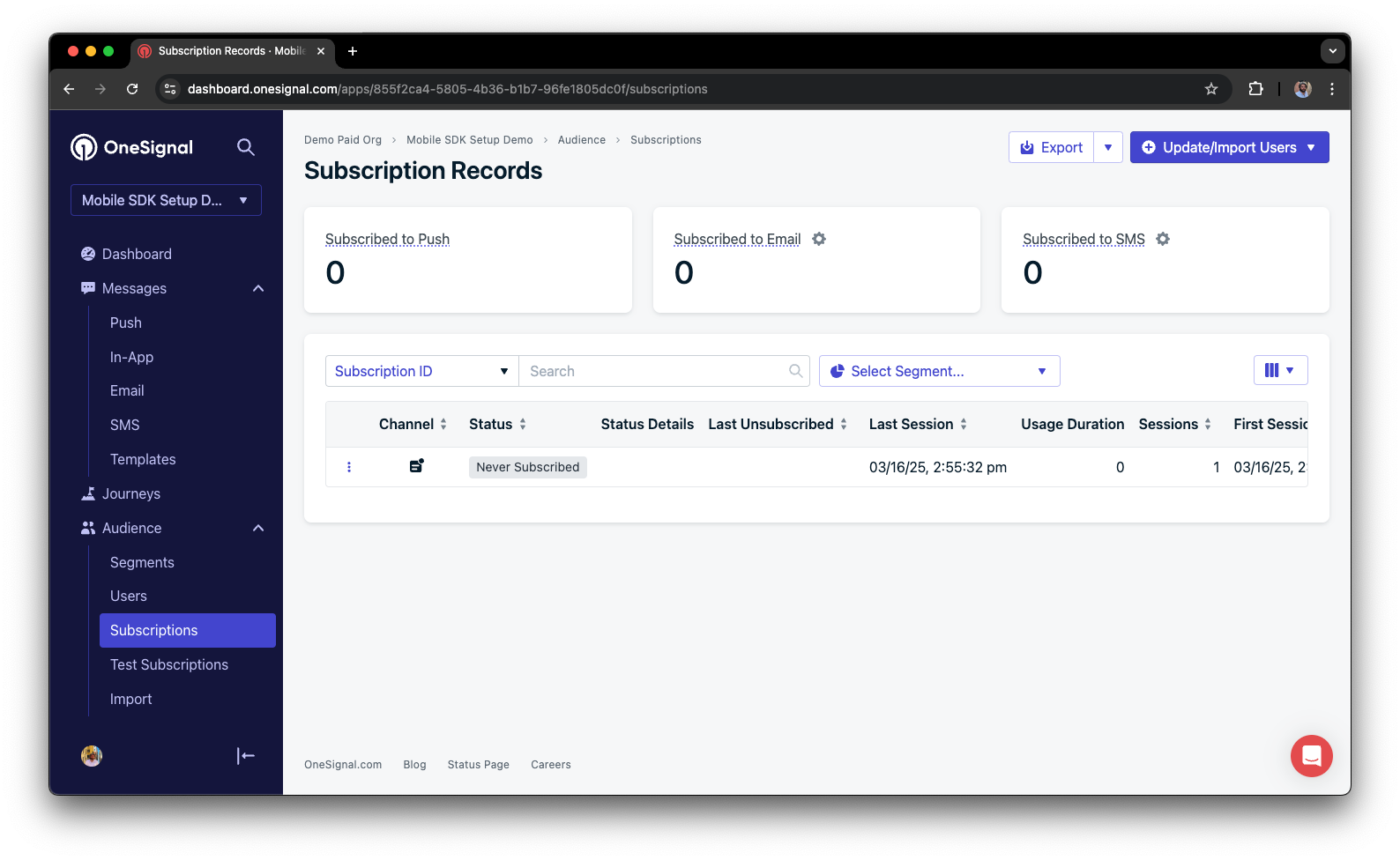
- Go to Audience > Subscriptions.
- You should see a new entry with the status “Never Subscribed”.

Refresh the OneSignal dashboard Subscription's page.
The subscription’s status should now show Subscribed.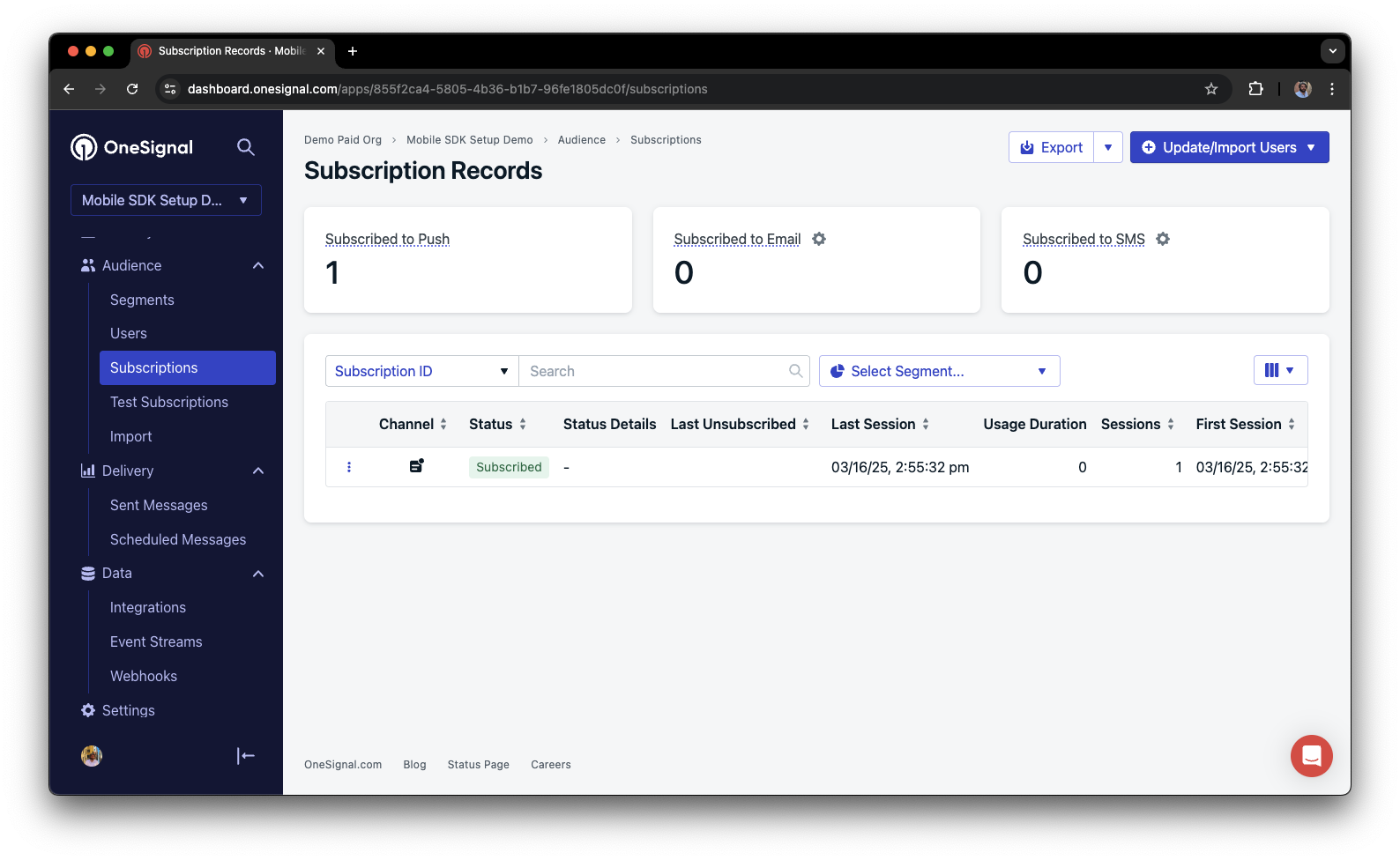

You have successfully created a mobile subscription.
Mobile subscriptions are created when users first open your app on a device or if they uninstall and reinstall your app on the same device.
Set up test subscriptions
Test subscriptions are helpful for testing a push notification before sending a message.Add to Test Subscriptions.
In the dashboard, next to the subscription, click the Options (three dots) button and select Add to Test Subscriptions.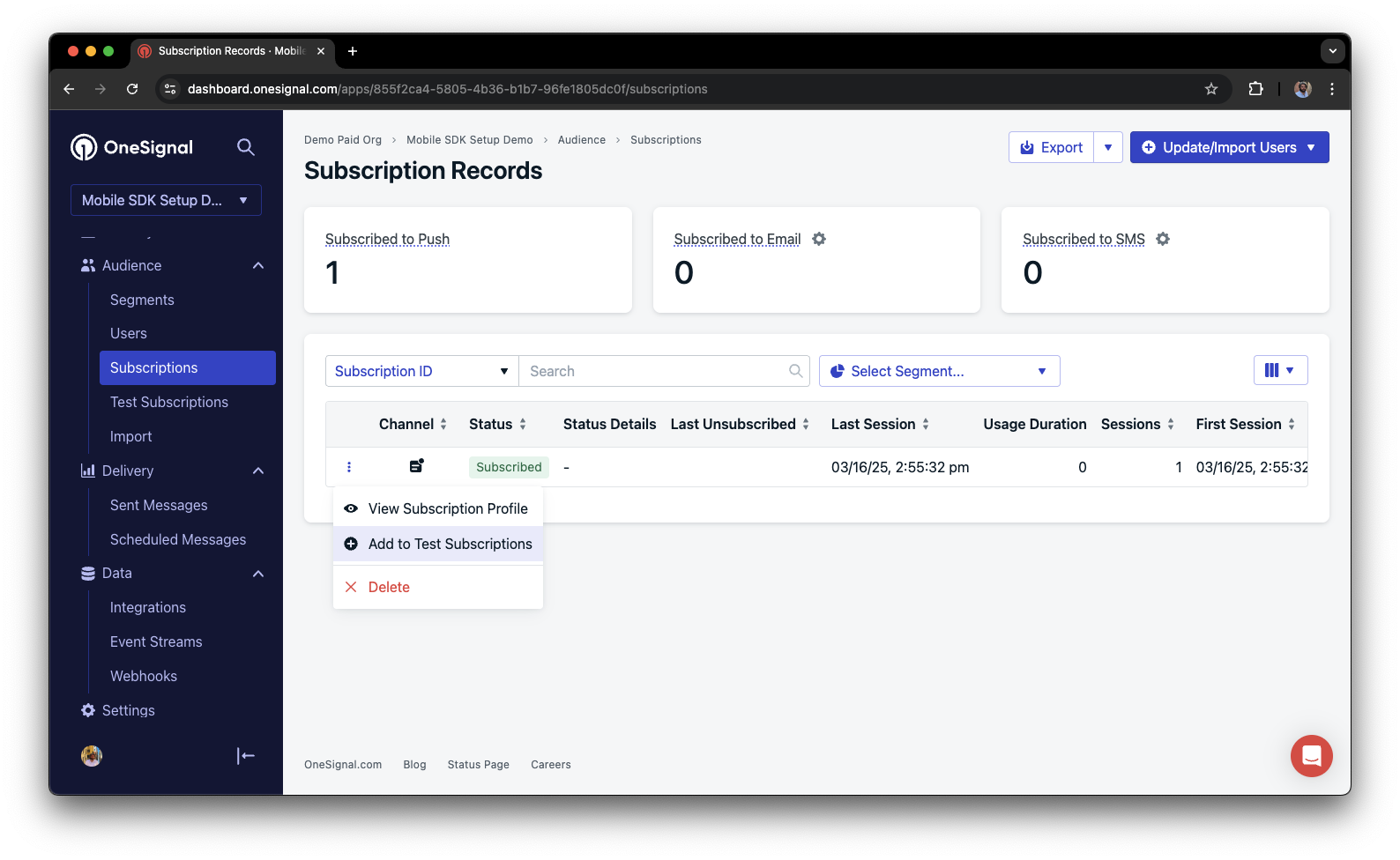

Name your subscription.
Name the subscription so you can easily identify your device later in the Test Subscriptions tab.
Name the segment.
Name the segment
Test Users (the name is important because it will be used later).Send test push via API
Get your App API Key and App ID.
In your OneSignal dashboard, go to Settings > Keys & IDs.
Update the provided code.
Replace
YOUR_APP_API_KEY and YOUR_APP_ID in the code below with your actual keys. This code uses the Test Users segment we created earlier.Check images and confirmed delivery.
If all setup steps were completed successfully, the test subscriptions should receive a notification with an image included: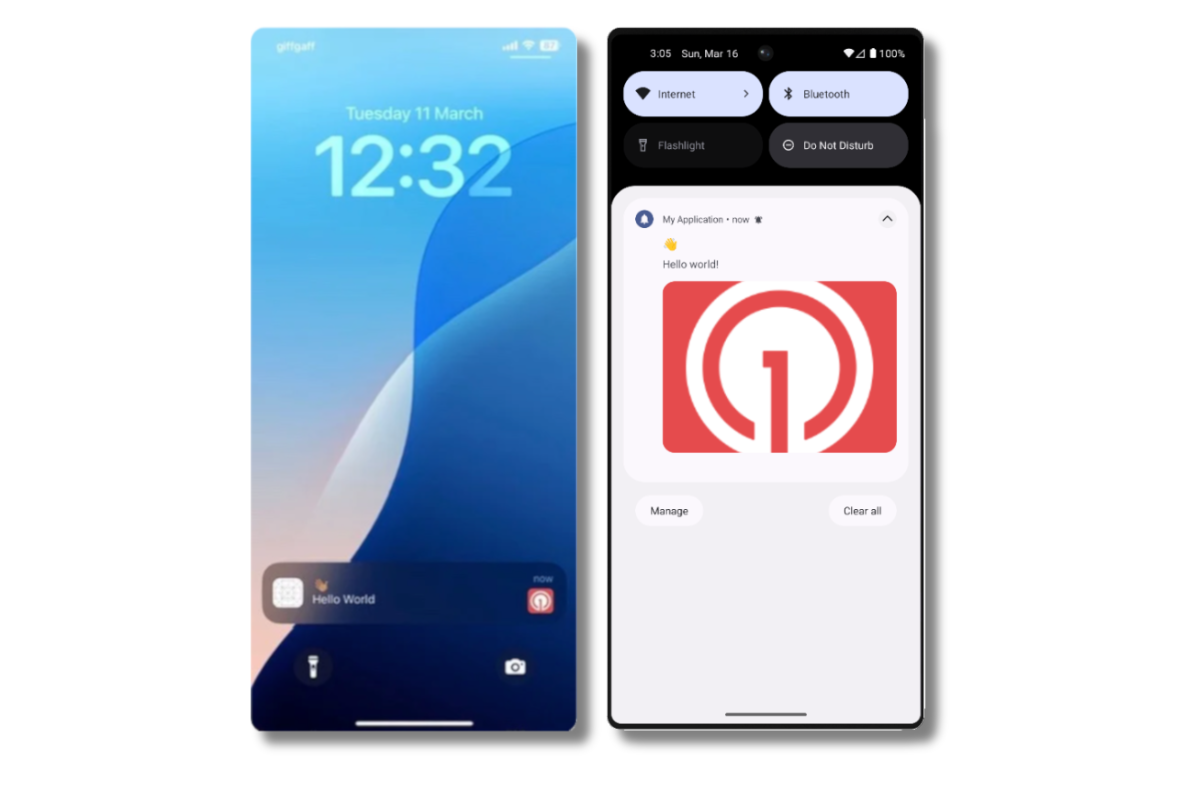

Images will appear small in the collapsed notification view. Expand the notification to see the full image.
Check for confirmed delivery.
In your dashboard, go to Delivery > Sent Messages, then click the message to view stats.You should see the confirmed stat, meaning the device received the push.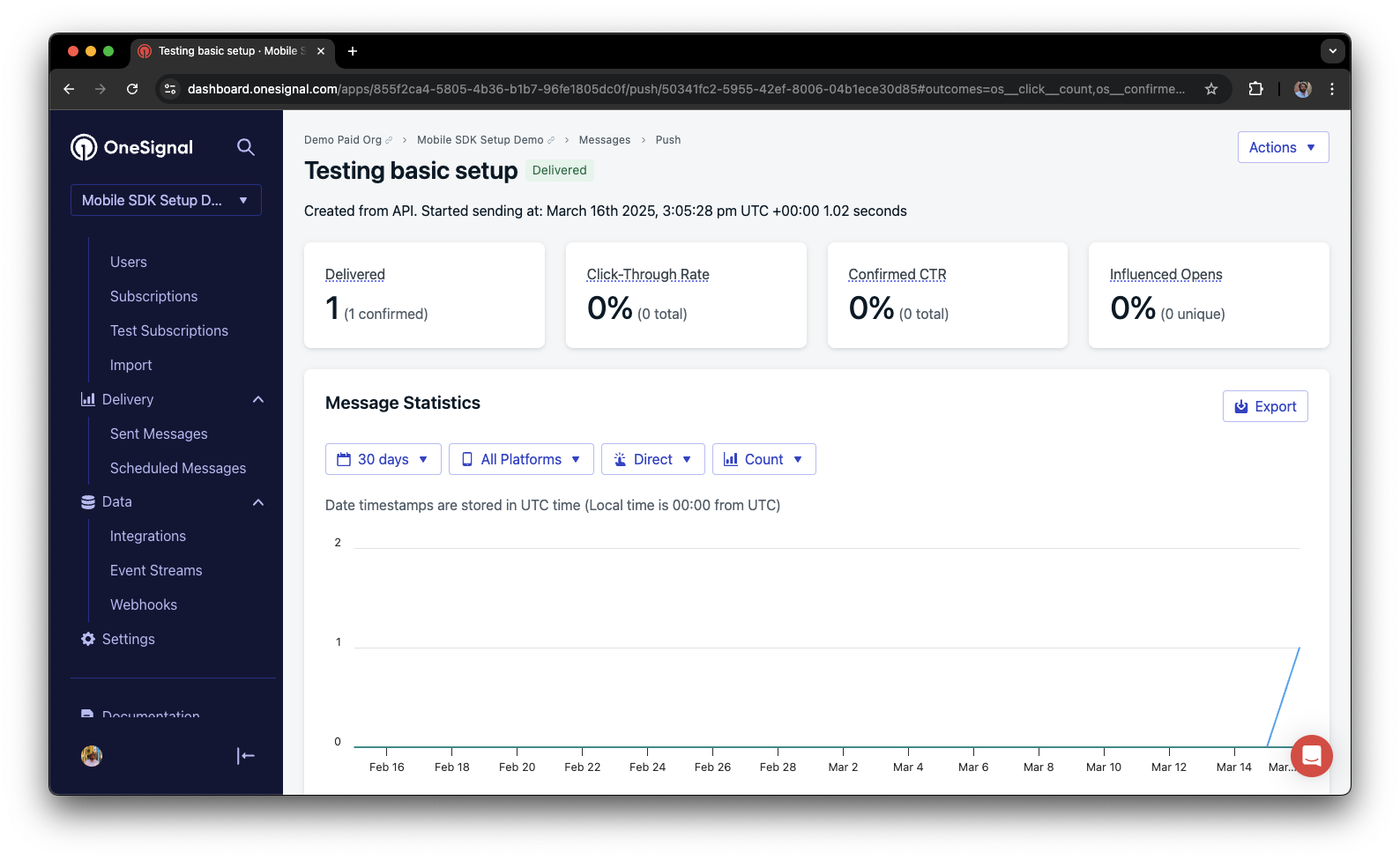
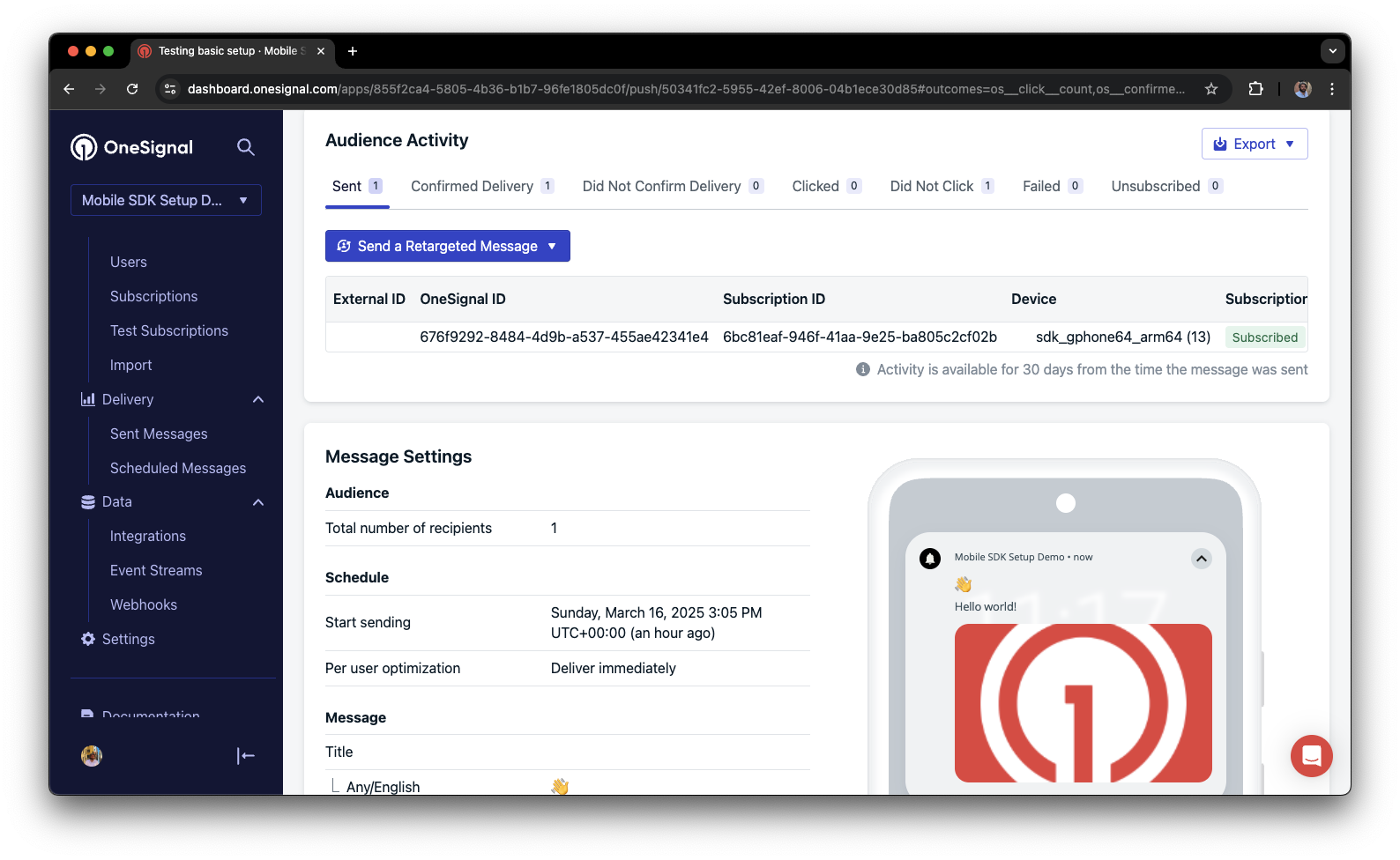


You have successfully sent a notification via our API to a segment.
Send an in-app message
In-app messages let you communicate with users while they are using your app.Close or background your app on the device.
This is because users must meet the in-app audience criteria before a new session starts. In OneSignal, a new session starts when the user opens your app after it has been in the background or closed for at least 30 seconds. For more details, see our guide on how in-app messages are displayed.
Create an in-app message.
- In your OneSignal dashboard, navigate to Messages > In-App > New In-App.
- Find and select the Welcome message.
- Set your Audience as the Test Users segment we used previously.
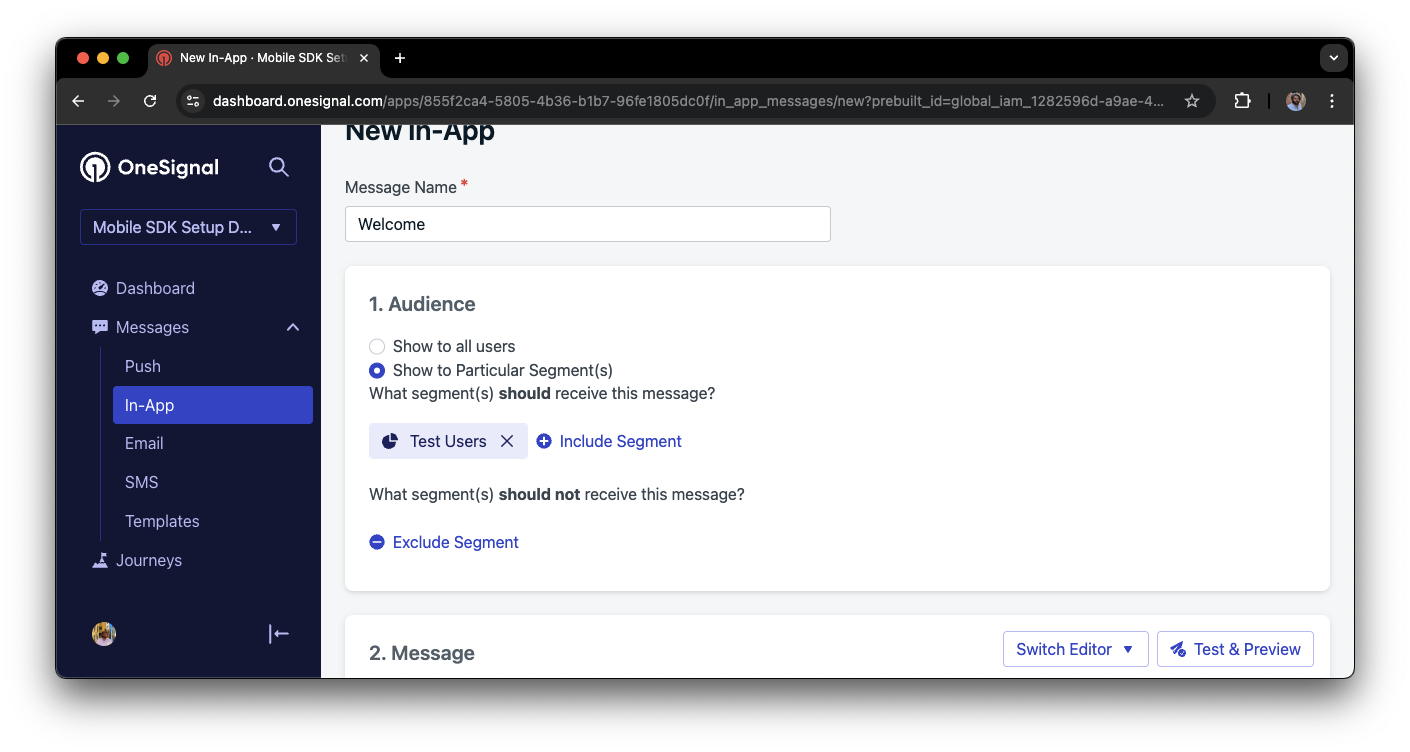
Schedule frequency.
Under Schedule > How often do you want to show this message? select Every time trigger conditions are satisfied.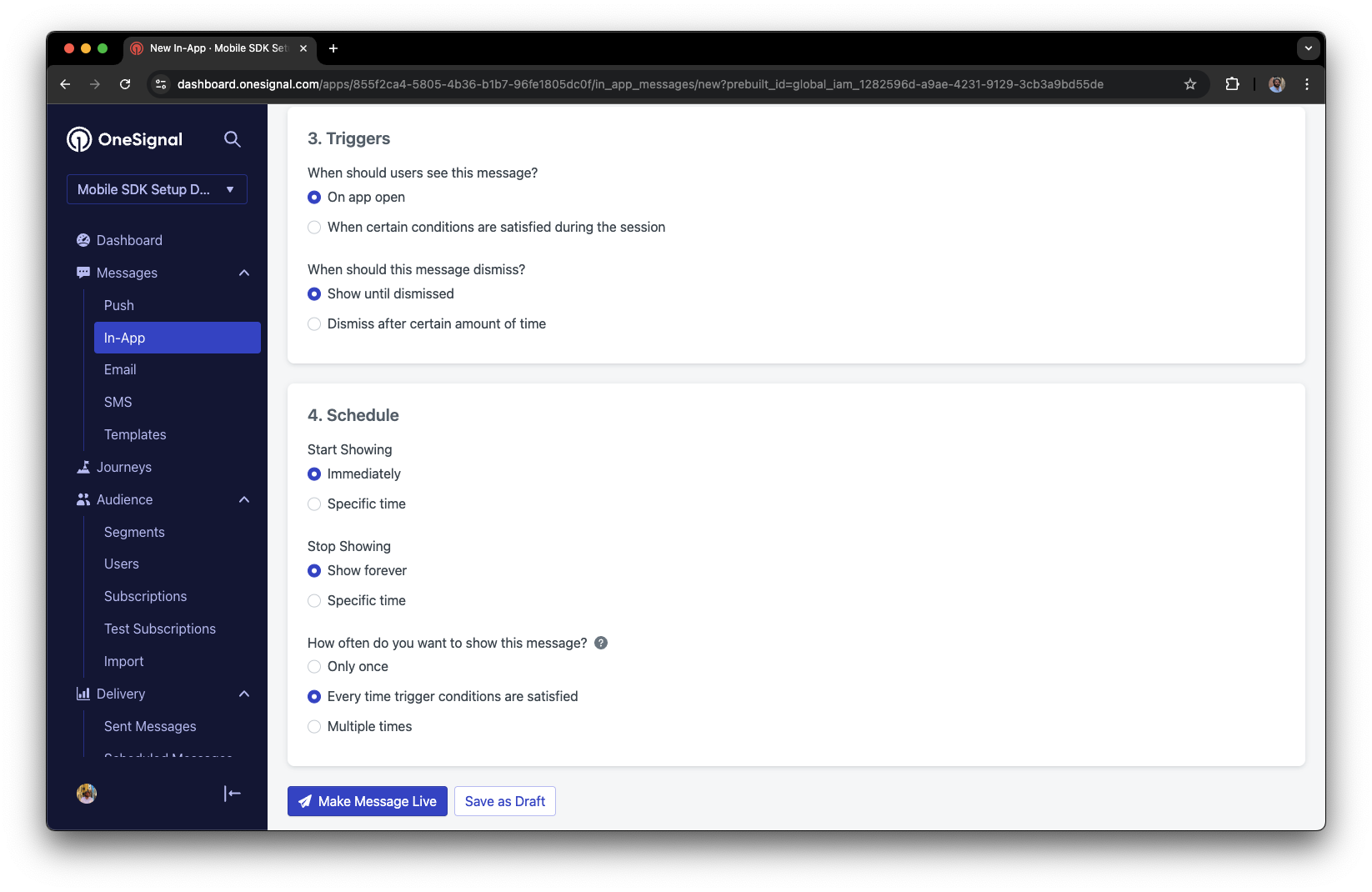

Make message live.
Click Make Message Live so it is available to your Test Users each time they open the app.
You have successfully setup the OneSignal SDK and learned important concepts like:
- Gathering Subscriptions, setting Test subscriptions, and creating Segments.
- Sending Push with images and Confirmed Delivery using Segments and our Create message API.
- Sending In-app messages.
User identification
Previously, we demonstrated how to create mobile Subscriptions. Now we’ll expand to identifying Users across all their subscriptions (including push, email, and SMS) using the OneSignal SDK. We’ll cover External IDs, tags, multi-channel subscriptions, privacy, and event tracking to help you unify and engage users across platforms.Assign External ID
Use an External ID to identify users consistently across devices, email addresses, and phone numbers using your backend’s user identifier. This ensures your messaging stays unified across channels and 3rd party systems (especially important for Integrations). Set the External ID with our SDK’slogin method each time they are identified by your app.
OneSignal generates unique read-only IDs for subscriptions (Subscription ID) and users (OneSignal ID).As users download your app on different devices, subscribe to your website, and/or provide you email addresses and phone numbers outside of your app, new subscriptions will be created.Setting the External ID via our SDK is highly recommended to identify users across all their subscriptions, regardless of how they are created.
Add data tags
Tags are key-value pairs of string data you can use to store user properties (likeusername, role, or preferences) and events (like purchase_date, game_level, or user interactions). Tags power advanced Message Personalization and Segmentation allowing for more advanced use cases.
Set tags with our SDK addTag and addTags methods as events occur in your app.
In this example, the user reached level 6 identifiable by the tag called current_level set to a value of 6.
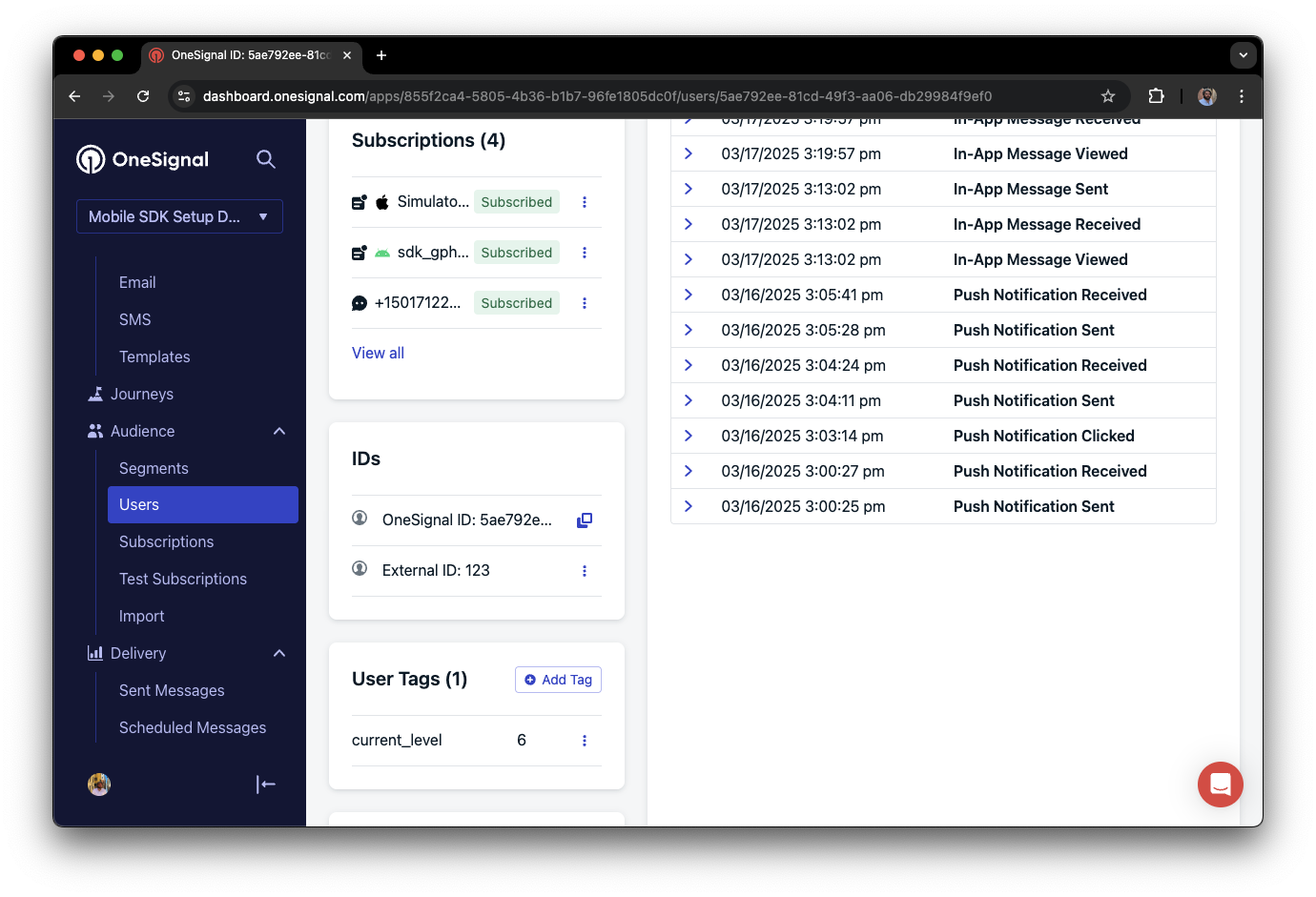
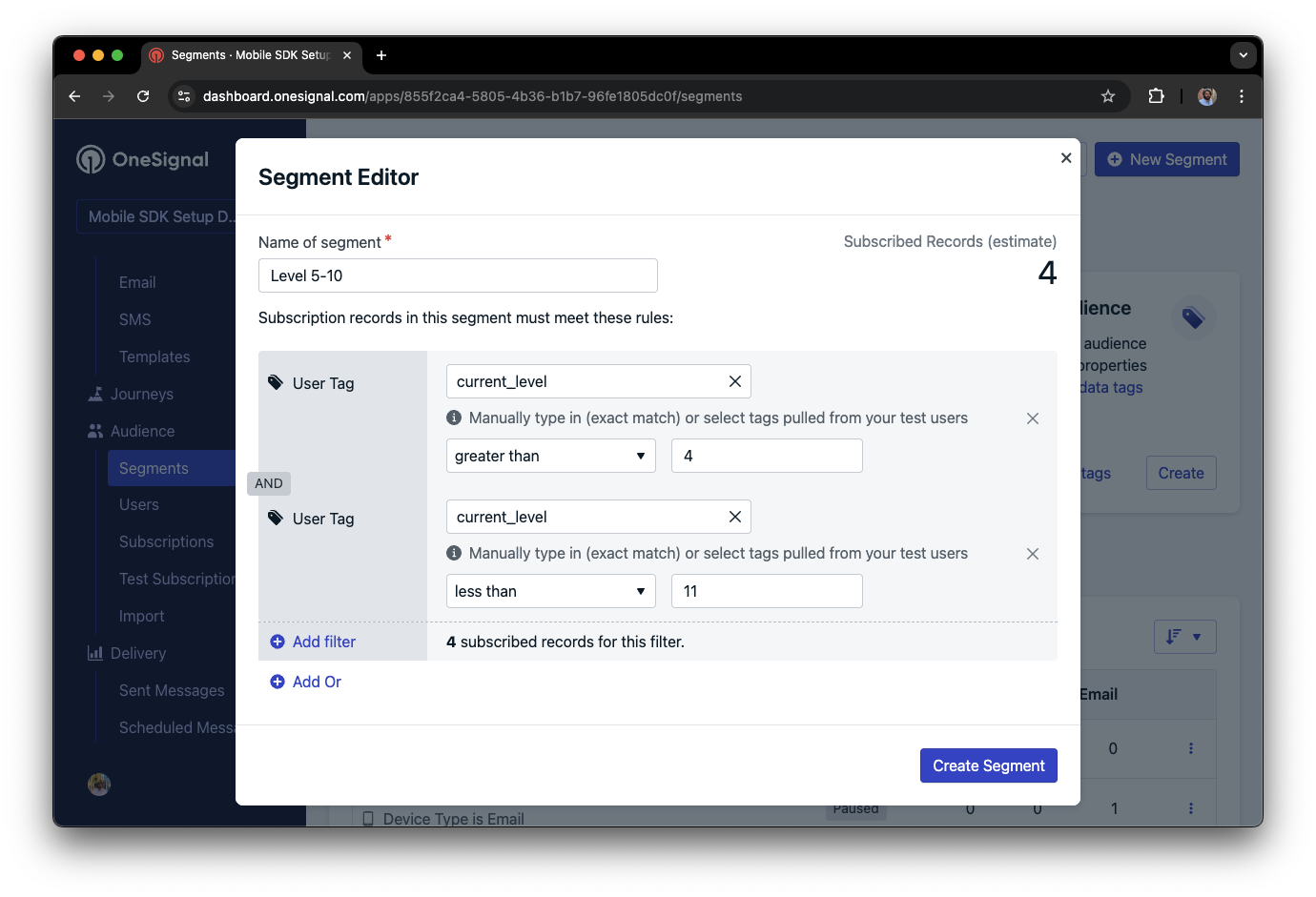
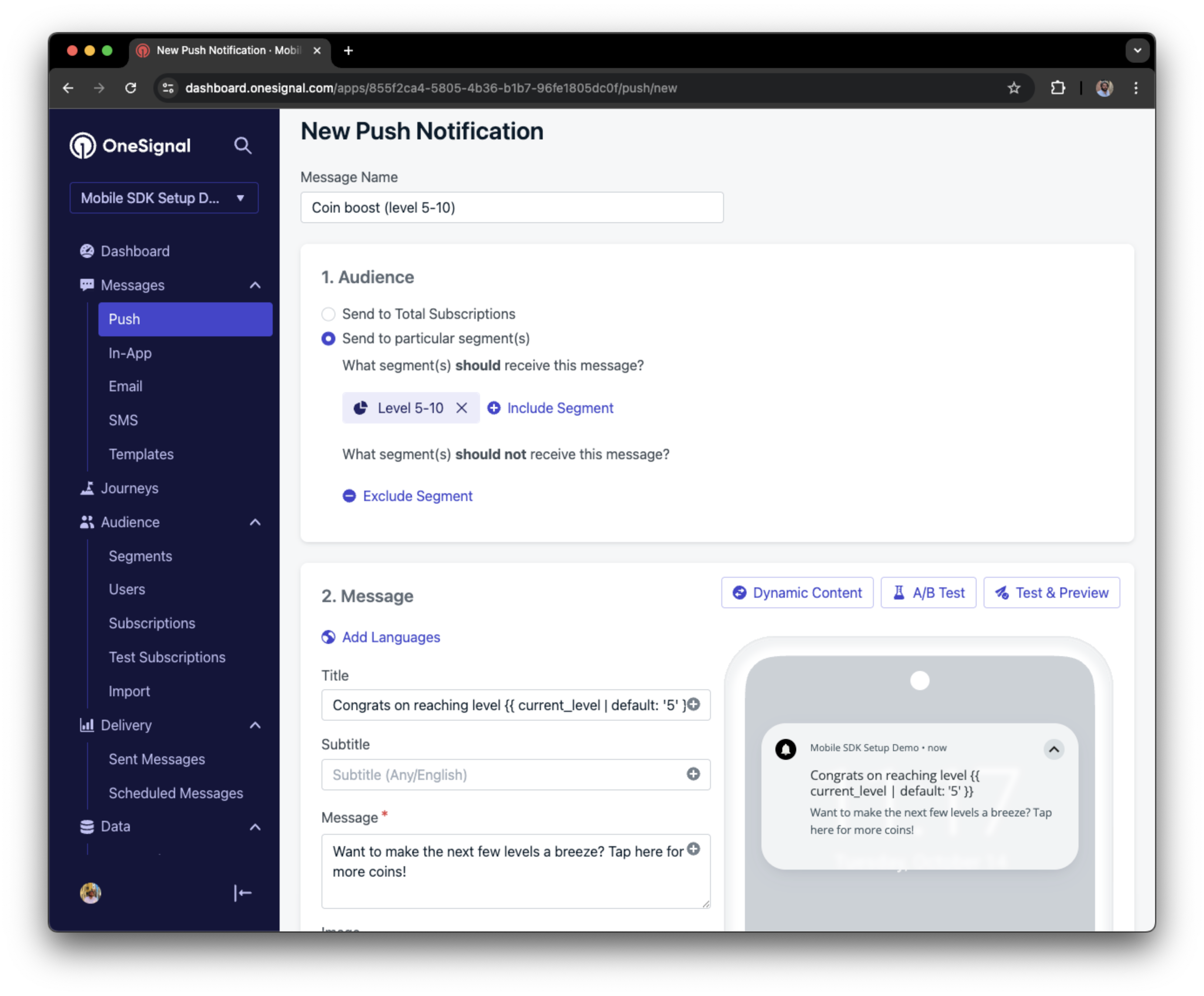
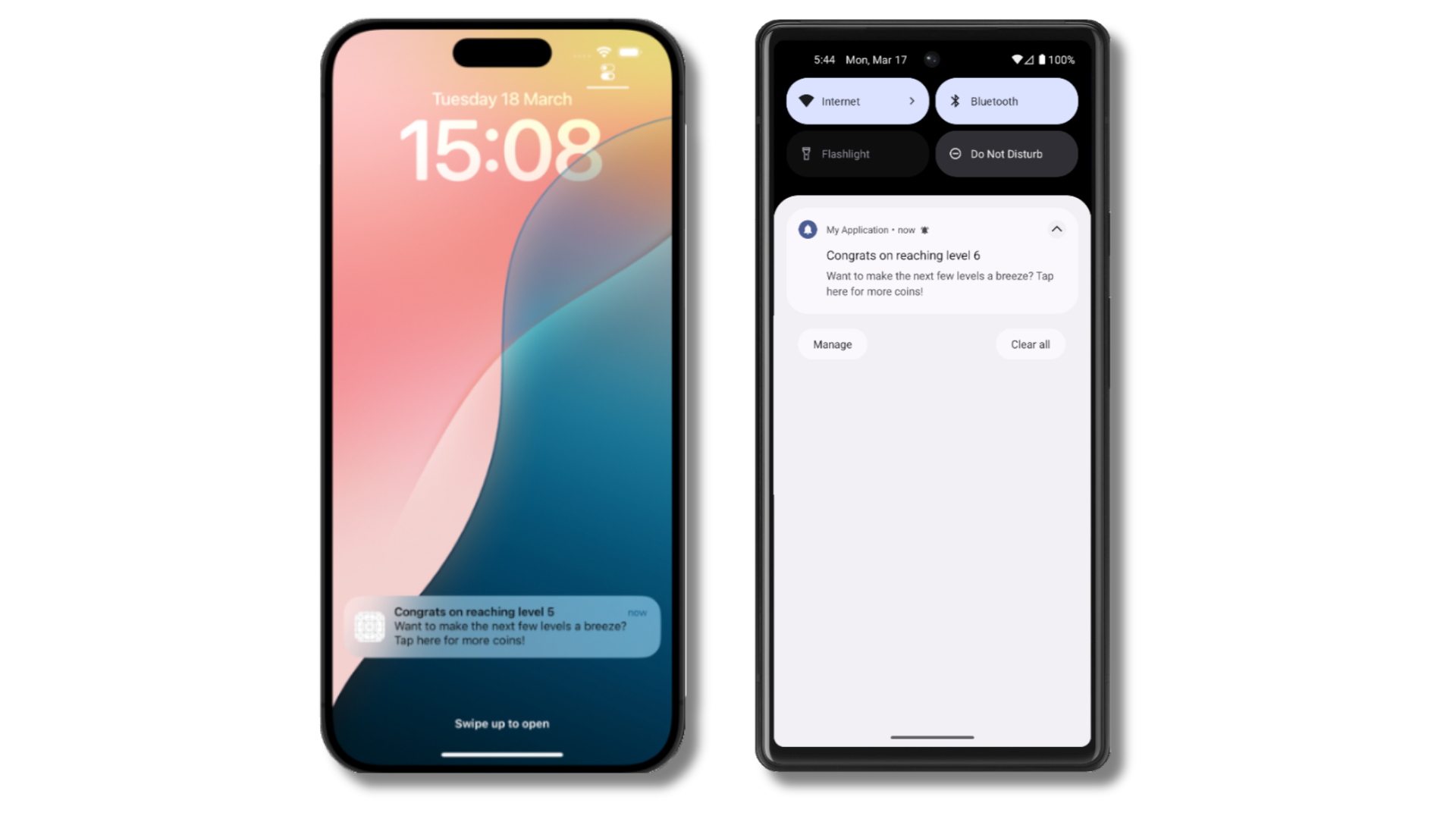
Add email and/or SMS subscriptions
Earlier we saw how our SDK creates mobile subscriptions to send push and in-app messages. You can also reach users through emails and SMS channels by creating the corresponding subscriptions.- Use the
addEmailmethod to create email subscriptions. - Use the
addSmsmethod to create SMS subscriptions.
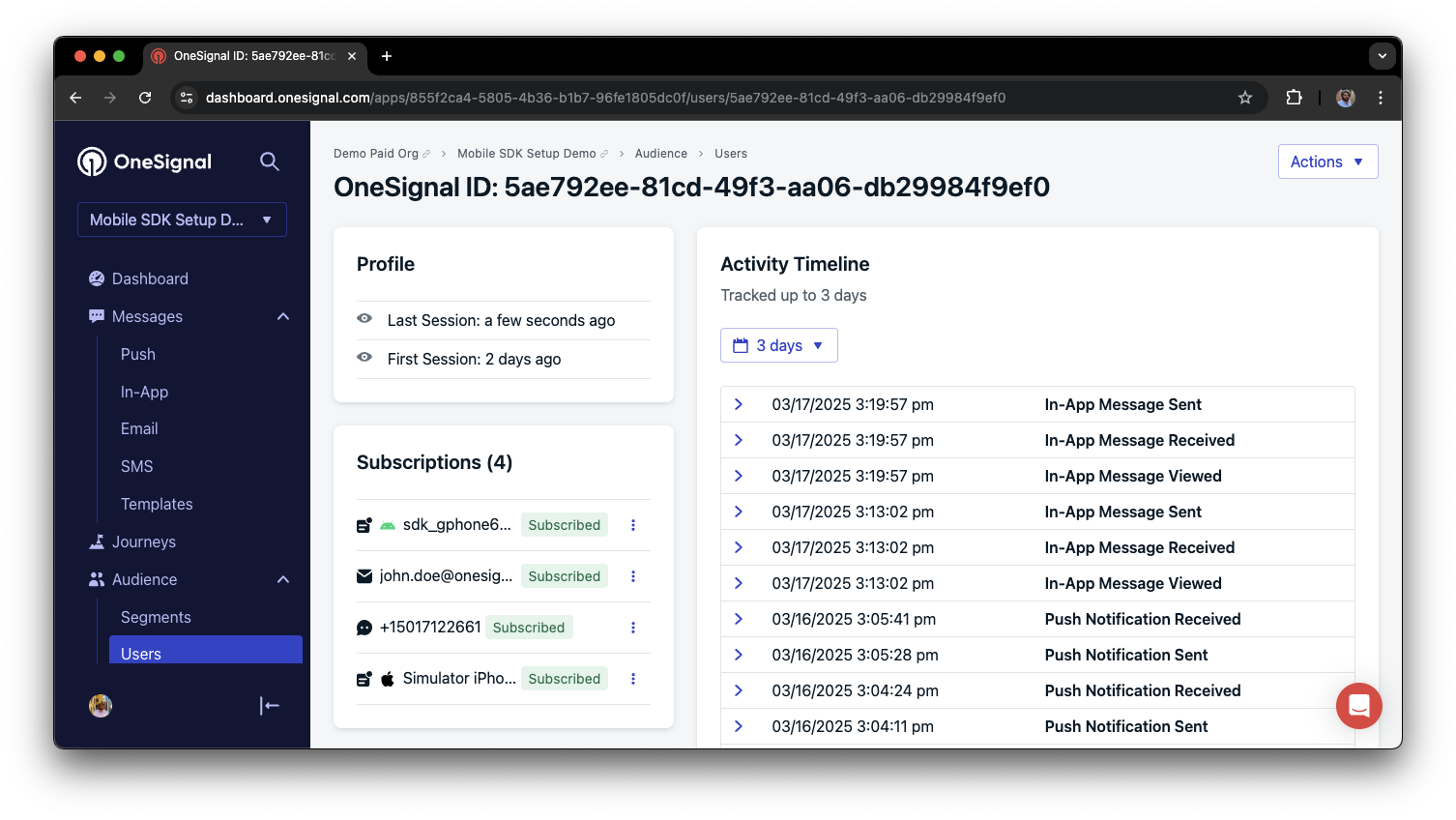
Best practices for multi-channel communication
- Obtain explicit consent before adding email or SMS subscriptions.
- Explain the benefits of each communication channel to users.
- Provide channel preferences so users can select which channels they prefer.
Privacy & user consent
To control when OneSignal collects user data, use the SDK’s consent gating methods:setConsentRequired(true): Prevents data collection until consent is given.setConsentGiven(true): Enables data collection once consent is granted.
Prompt for push permissions
Instead of callingrequestPermission() immediately on app open, take a more strategic approach. Use an in-app message to explain the value of push notifications before requesting permission.
For best practices and implementation details, see our Prompt for push permissions guide.
Listen to push, user, and in-app events
Use SDK listeners to react to user actions and state changes. The SDK provides several event listeners for you to hook into. See our SDK reference guide for more details.Push notification events
addClickListener(): Detect when a notification is tapped. Helpful for Deep Linking.addForegroundLifecycleListener(): Control how notifications behave in foreground.
User state changes
addObserver()for user state: Detect when the External ID is set.addPermissionObserver(): Track the user’s specific interaction with the native push permission prompt.addObserver()for push subscription: Track when the push subscription status changes.
In-app message events
addClickListener(): Handle in-app click actions. Ideal for deep linking or tracking events.addLifecycleListener(): Track full lifecycle of in-app messages (shown, clicked, dismissed, etc.).
Advanced setup & capabilities
Explore more capabilities to enhance your integration:- 🔁 Migrating to OneSignal from another service
- 🌍 Location tracking
- 🔗 Deep Linking
- 🔌 Integrations
- 🧩 Mobile Service Extensions
- 🛎️ Action buttons
- 🌐 Multi-language messaging
- 🛡️ Identity Verification
- 📊 Custom Outcomes
- 📲 Live Activities
Mobile SDK setup & reference
Make sure you’ve enabled all key features by reviewing the Mobile push setup guide. For full details on available methods and configuration options, visit the Mobile SDK reference.Congratulations! You’ve successfully completed the Mobile SDK setup guide.
Need help?Chat with our Support team or email
support@onesignal.comPlease include:- Details of the issue you’re experiencing and steps to reproduce if available
- Your OneSignal App ID
- The External ID or Subscription ID if applicable
- The URL to the message you tested in the OneSignal Dashboard if applicable
- Any relevant logs or error messages
